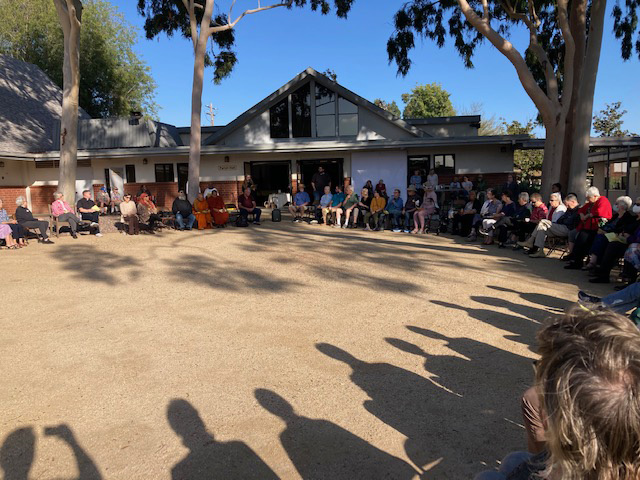
Vigil participants gather outside St. Ambrose’s Church, Claremont, on Oct. 29 to mourn the loss of life in the Gaza conflice and commit to working for peace. Photo: Thom Johnson
[The Episcopal News] Episcopalians in Claremont and Pasadena joined interfaith partners last weekend in vigil and for conversation and support in response to the ongoing Israeli-Palestinian conflict, triggered by an Oct. 7 Hamas attack on an Israeli kibbutz.
About 80 participants gathered Sunday Nov. 5 at St. Ambrose Church in Claremont, amid the haunting lilt of a flute and powerful drumbeat, to mourn the loss of life. The vigil replaced an annual walk sponsored by the Inland Valley Interfaith Working Group for Middle East Peace, because “people are still in shock, traumatized by what’s happened and they aren’t ready to process it, to connect,” said the Rev. Jessie Smith, St. Ambrose’s rector.
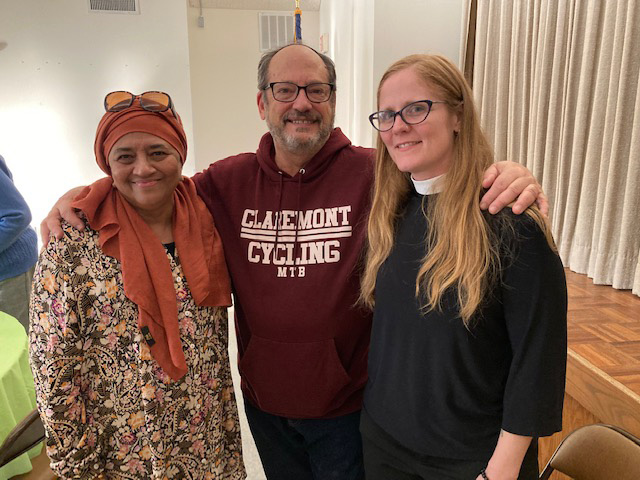
Rehana Mowjood of City of Knowledge Islamic School, Cantor Paul Buch from Temple Beth Israel, and Jessie Smith, rector of St. Ambrose’s Church, were among the faith leaders at the Oct. 29 vigil. Photo: Thom Johnson
Prayers and periods of silent meditation were offered both outside and inside the church, she said. “Liturgical dancers guided us through that time and led the congregation inside where they were able to light a candle symbolizing the hopes that exists among us all.”
“We prayed out of grief and mourning for those who died and, in the spirit of accountability, to ask the question, what is our own part to examine …in working for peace and the role of peace and violence in the world.” A third part was moving toward hope for future peace, followed by a chili dinner, she added.
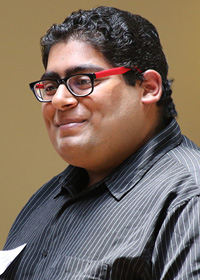
Tahil Sharma, pictured at a forum in 2018, is an interfaith minister for the Diocese of Los Angeles. He was among the participants in the Claremont vigil. Photo: Janet Kawamoto
For Tahil Sharma, the vigil “was the first opportunity I’ve had [since the start of the war] to reflect on the loss of life, the escalation of violence, and the role of interfaith cooperation. Our silence was painful, and sorrowful, and mirrored the uncertainty of any positive outcomes.
“But it was also a moment to gather any semblance of mutual mourning and solidarity we could muster at this time,” said Sharma, a Los Angeles based interfaith activist who was born to a Hindu father and a Sikh mother. He is one of three interfaith ministers of the Diocese of Los Angeles.
“This silence was an incubator for a growing commitment to interfaith cooperation and the newly sought understanding that peace is not guaranteed, but achieved by the commitments to justice, equity, and abundance that we all deserve,” he said.
The turnout was significant, given reports of violence in the wake of the conflict. The Antidefamation League has reported a 400% increase in antisemitic attacks since the conflict began.
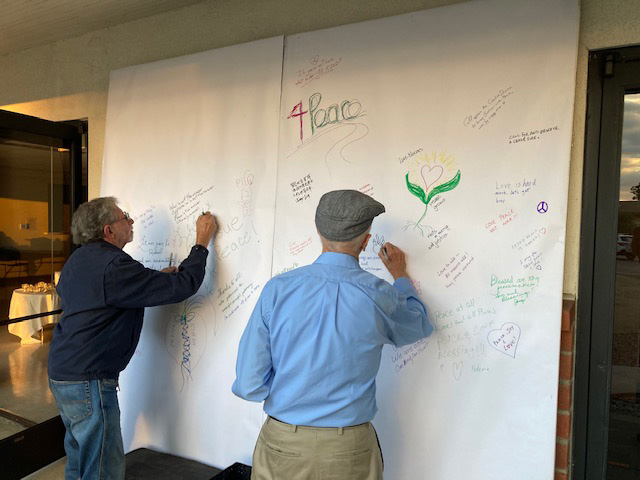
Vigil participants write on the prayer wall. Photo: Thom Johnson
Similarly, the Council on American-Islamic Relations said it received 774 reports of bias incidents and requests for help from Muslims across the U.S. from Oct. 7 to 24, a 182% jump from the average 16-day period in 2022.
Sharma added: “Although the silence was a valuable pause of healing at the moment, we cannot ignore the urgent need to address nuances while maintaining an unapologetic position to achieve accountability for all the innocent lives that are held captive and are being murdered every day. Our work for pluralism calls us to reflect on our scriptures that constantly remind us of the sacred dignity of human life, not just the lives of our own. We are also reminded that hypocrisy itself is a mockery and that our pursuit of peace, justice, or healing is not selective or exceptional by any means. There is no room for retribution or an exchange of war crimes. Period.
“If this event made me remember anything, it was this: I didn’t come here for the food, for the music, for the time to introspect. I came because my interfaith community was in pain, and I am equally responsible for their care because we all deserve better. If we cannot show up for each other in times of sorrow and for proactive exchanges, I have no reason to show up for joy that is feigned and disingenuous.”
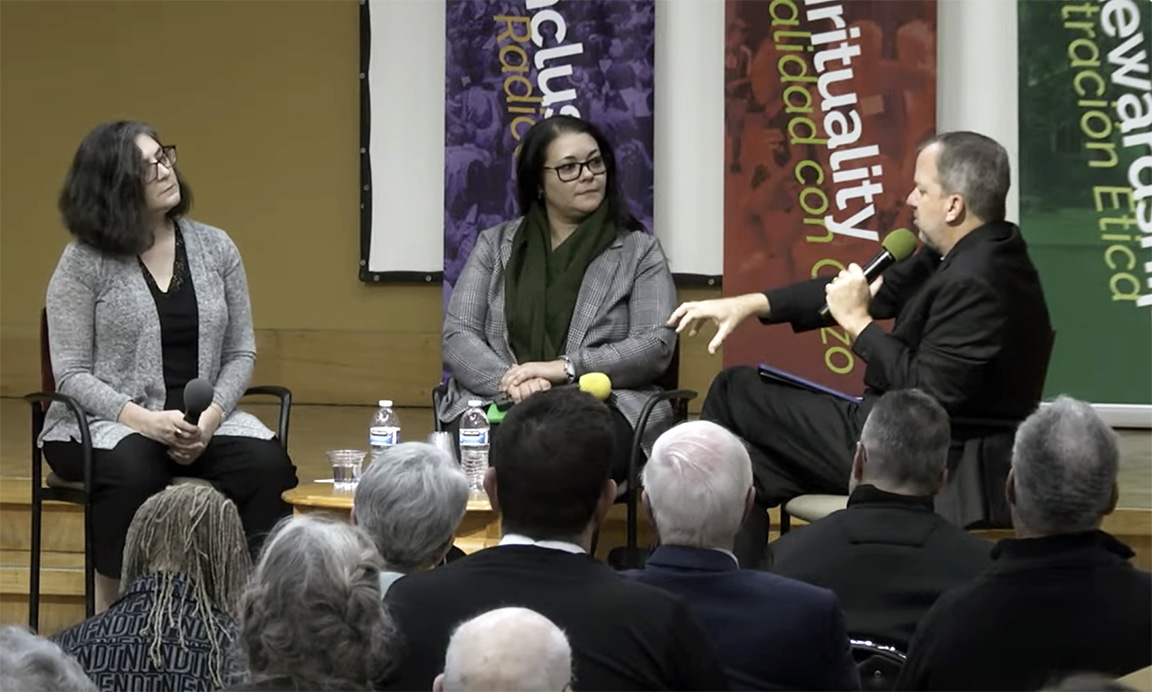
Andrea Hodos, associate director (left) and Aziza Hasan, executive director of Newground: A Muslim-Jewish Partnership for Change, discuss the Gaza conflict with moderator Mike Kinman, rector of All Saints Church, Pasadena. Photo: screenshot
Forum in Pasadena hosts members of Muslim-Jewish partnership
During a Sunday, Oct. 29 rector’s forum at All Saints Church in Pasadena, the Rev. Mike Kinman hosted Aziza Hasan, executive director, and Andrea Hodos, associate director of Newground: A Muslim-Jewish Partnership for Change. The organization’s mission is committed “to fostering authentic dialogue, relationships, and narrative between the Los Angeles Muslim and Jewish communities,” according to its website.
The video may be viewed here.
Hasan said she is the daughter of a Palestinian Muslim man and a Christian woman who spent her early years in Jordan. It is essential to maintain the ability to see and to witness to one another through the current conflict, she said.
“We’re at this poignant moment right now. I’m looking at people that I love and they’re in such deep pain, and they can’t see the pain of other people,” she said. “We all just want to belong. We want to know that our lives are sacred. We have to call people to love.”
Both Hasan and Hodos, who is Jewish, said the conflict has re-triggered old hurts and trauma, and they stressed the importance of compassion and extending grace.
“If you’re in this room, and you’re a Christian person and you have Jewish friends and you have Muslim friends, and you haven’t reached out to them yet, you absolutely can do it,” Hodos said tearfully. “It’s okay to make a mistake. That’s a really important part of our space, to give one another grace and say, I just wanted you to know I’m thinking about you. This must be so deeply painful. And I’m here if you want to talk and no pressure to reach back. That’s all you need to say.”
